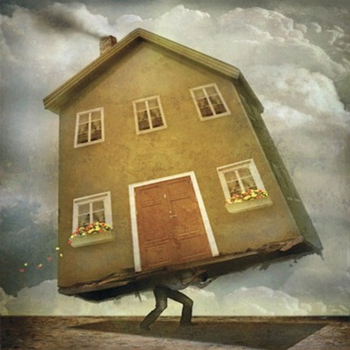So how did all of this come about? It revolves around the tax code. The main culprit is the interest deduction that Uncle Sam allows for you to deduct on your taxes. This deduction dates back to the beginning of the income tax itself, 1913. Due to the mortgage interest deduction and the $250,000 primary residence exemption ($500,000 for joint tax returns), the government actually encourages you to borrow as much money as is possible and to buy as big of a house as possible in order to get these benefits. Due to the standard deduction 2013 you're probably going to need to borrow in excess of $160,000 or in order to get any sort of benefit from it at all. And that's for the first year of your loan. The benefit decreases each year as you pay down the debt. Which causes many people to constantly "trade up" every 5-10 years for a bigger and bigger house. This has worked out well for some people who downsized and retired on the equity in their home. But again it requires for everything to work out perfectly.
Let me now explain why this is a bad idea. I bought into the whole scenario, as did millions of Americans when I got out of college. Hell my Forrest Gump professors even told me it was a good idea! The problem with this whole situation is that it leaves you with much less money to invest in other cash producing assets. One of the first people that I read who pointed it out is Robert Kyosaki of RICH DAD POOR DAD fame. I disagreed with him at first, but he's totally right. On top of this, larger homes cost more money for things that you don't get any sort of benefit from, namely, insurance, maintenance, and HOA dues. This is the definition of being house poor. You pay so much for your monthly housing expenses that you have no money to do anything else.
Real estate is a good investment in general because of the following leveraged reason. To make the math simple here you go: you buy a $100,000 with a 20% down payment of $20k + $2k in transaction fees. The $22k is your investment. Even if the property is cash flow negative to the extent that you make nothing on the equity contribution of your mortgage, this still nets you between an 9% return if you assume a meager 2% housing appreciation (2/22 = 9.1%). As time goes on and compounding inflation kicks in, this rate of return will increase exponentially. Never buy a piece of real estate that is cash flow negative though! Relying solely on future appreciation rates is idiotic. If you buy one that is cash flow positive you should be making 15% on your investment with it rising each year going forward. That's double what the long term average is for the stock market!
In order to prevent this, here are two things that you should try to do:
1. Buy a house that fits your needs, not the most that the bank will let you buy. A family of 3 doesn't need a 4,000 square foot house with 4 bedrooms. They need a 1,500 sq. ft home with 3 bedrooms. "But what about when friends stay over?" that's what the couch is for. The smaller the better, but not too small that nobody else would want to buy it.
2. If you do find yourself with too much house (like I did because of a witch) then rent out some rooms or turn the property into some other form of cash producing property. Start a business out of the garage or use empty rooms as a storage facility for ca$h. The whole idea is that you have an asset that is generating income, rather than draining you of cash.

 RSS Feed
RSS Feed
